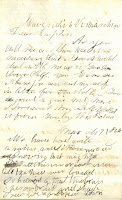Henry Turner was part of an exodus of black families fleeing slavery after they discovered that the Union soldiers were across the river in Virginia. We do not know why Atherton hired Henry, nicknamed "Vort." Unions soldiers were allowed to have servants and Turner stayed with Atherton in that capacity. In his diary for the day Atherton wrote, "Take a little contraband, 15yr. old from the Provost Marshall’s for a servant with his mother’s consent. His name is Henry Turner [Vort]."I am writing at Colonel Veasey’s headquarters. I have made an acquisition today, viz: Henry Turner a contraband 16 years old, bright and active. He left his Secesh Master yesterday. His mother with four children and three grown women have gone to Washington. The boy will go with me wherever I go and finally, I presume to Vermont.
On April 16, 1862, Atherton was severely wounded at Lee’s Mills during General McClellan’s peninsular campaign and resigned on August 12, 1862. It was then that Turner came home with Atherton to Vermont. By all accounts, Turner was accepted into the family. He lived with the Athertons in Cavendish, Vermont, where Henry Atherton’s mother Roxane taught him to read and write and made him clothes.
By 1864, Turner had mastered writing and he wrote a letter to Atherton appearing to ask for a wage increase of "one dollar," which Atherton agreed to pay him. That same letter also includes news written by Atherton’s brother Joseph who felt that "Vort has worked hard for the Dollar but has not made so much progress in writing as he ought to." With Henry Atherton being occupied with his legislative duties, Turner worked primarily with and for Joseph on the farm and sawmill.
When he was suitably prepared, Turner attended the Duttenville district school, the same school Henry Atherton had attended as a boy. We do not really know what became of Turner, although, in another letter he sent the family in 1879, he describes his work in Boston as a driver for "the richest man in Cambridge."
Henry B. Atherton’s correspondence is part of his papers (MS-1409), which we have recently acquired and processed.


No comments:
Post a Comment